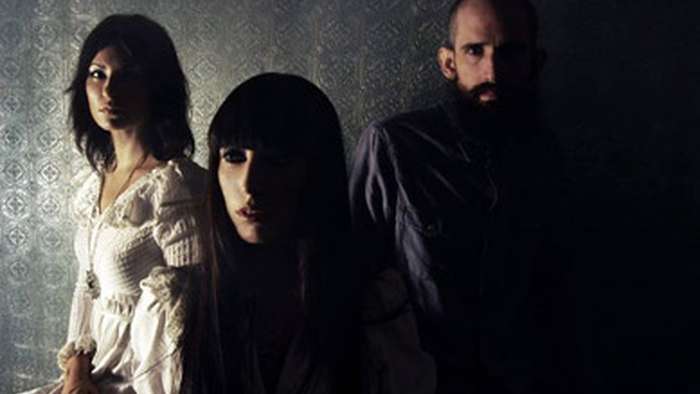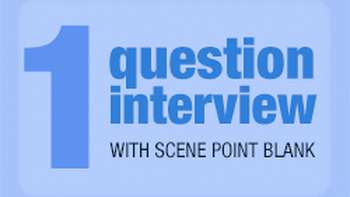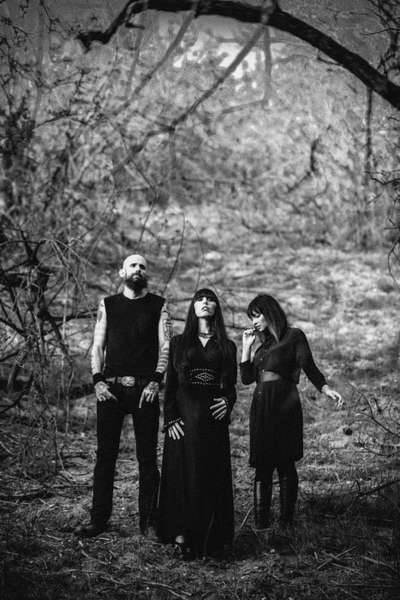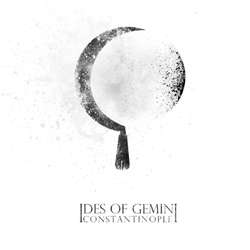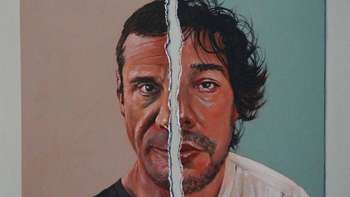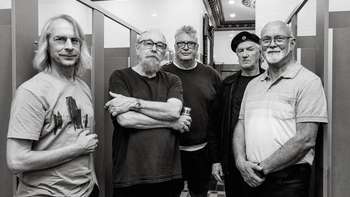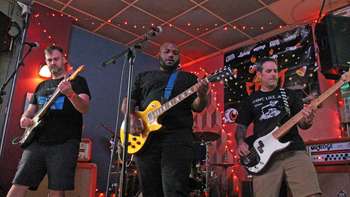The three-way partnership between Sera Timms (vocals/bass), Kelly Johnston (drums/vocals) and J. Bennett (guitar/vocals) forms Ides of Gemini, a reverb-laden doom metal trio. Bennett, a renowned metal writer, took some time to chat to SPB about performing, releasing records and mixing music with journalism (who ever thought that was a good idea?).
Scene Point Blank: How did you form as a full unit?
J: The short answer: carefully. The longer version is that Sera and I wrote and recorded The Disruption Writ EP by ourselves and then met Kelly [Johnston] through a couple of mutual friends. After a few months of practice and getting to know each other, we played our first show together in May of 2011.
Scene Point Blank: How did you go about making yourselves ready as a touring band and were the songs on the record formulated with that aspect in mind?
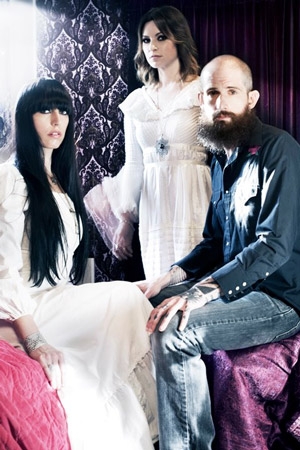 J: Getting ready to tour was really just a matter of practicing and learning from any of the mistakes and/or technical difficulties we’d experienced at previous gigs. We did our first tour overseas in the fall of 2012 and, beforehand, we were informed that at most of the shows we’d be expected to play for an hour. The problem was that we only had about 48 minutes of material at the time. Luckily, the audiences were very understanding.
J: Getting ready to tour was really just a matter of practicing and learning from any of the mistakes and/or technical difficulties we’d experienced at previous gigs. We did our first tour overseas in the fall of 2012 and, beforehand, we were informed that at most of the shows we’d be expected to play for an hour. The problem was that we only had about 48 minutes of material at the time. Luckily, the audiences were very understanding.
We definitely did not write the songs with touring in mind, though. In fact, that first tour cured us of the notion that all of our songs should be played live. There’s at least one song on the album that we’ll probably never play again. It works fine as a recording, but it loses something in the live setting.
Scene Point Blank: I've heard more than a few genre names given out to describe what you do. How would you personally describe your sound and what bands helped to shape it?
J: I’ve heard quite a few descriptions as well, and I think that means we’re doing something right. Someone on the internet referred to us as “dream doom,” which we really liked for a while, but with the material we’ve been writing for our next record I’m not sure it fits as well as it once did. As far as the bands that helped shape our sound, we all listen to so many different things that it’s hard to pinpoint how they come together in Ides of Gemini. We’re at the stage now where, if we start writing something that sounds too much like someone else, we tend to throw it out. But you’ll definitely hear a couple of riffs on the new record that have obvious origins.
Scene Point Blank: So you guys went from self-releasing a demo/EP to being on Neurot. How did that situation come about and how has it been so far?
J: Steve Von Till and Scott Kelly from Neurosis/Neurot heard our demo EP online and contacted us. We could hardly believe it when they emailed us, but working with them has been fantastic. Being musicians themselves, they have a totally different perspective on “the music business” than the folks at most labels. I can’t say enough good things about those guys. They’re awesome.
Scene Point Blank: How did this particular tour (Haze Over North America With Ghost) come about? It seems like a pretty big step for the band in regards to exposure.
J: It was absolutely a huge step for us. In terms of exposure, it was like hitting the lottery. We weren’t completely sure how we got picked for it until a few days into the tour when we talked with Papa, who said Erik from Watain told him about us. We had opened the Los Angeles date of the Decibel magazine tour in 2012, which consisted of Behemoth, Watain, The Devil’s Blood, and In Solitude. Apparently Erik watched our set, though none of us actually spoke with him that night. After the tour, he went back to Sweden and told Papa about us. So we really owe it all to Papa, Erik and Albert Mudrian from Decibel, who put us on that Watain show to begin with.
Scene Point Blank: So it's no secret that you're a well-regarded journalist, particularly within the metal community. How does that endevour coincide with writing and playing music. Do they hurt or help to inform each other in any way?
J: Thank you very much for the kind words. I try to keep the two separate as much as possible, but the journalism does inform me in the sense that I know what other bands are doing and therefore what to avoid. For instance, I recently learned that another band has a song on their new album with the same exact title we’re currently using for a song that’s going to be on our next album. We’ll definitely change ours now. So I guess you could say that the journalism keeps me on my toes when it comes to originality.
Scene Point Blank: How do you feel that the atmospheric nature in the bands recorded work carries over into the live setting?
J: The atmosphere of our recordings doesn’t carry over to the stage nearly as much as we’d like. In the studio, Sera does lots of layers and harmonies with her vocals that we currently can’t duplicate onstage. There’s always the possibility of using backing tracks, but I’m not convinced that’s such a hot idea because it adds an extra level of stress—and possible malfunction—to the live show. For now, my own attitude is that the live show is a completely different entity than the recording. But we’re definitely working on that.
Scene Point Blank: How big of a role does presentation have to do with the recorded piece for you? With disruption writ it was a rather meticulously put together package whereas Constantinople consisted of a more stark look overall.
J: We feel that the visual presentation of an album or release is just as important as the music itself. There are quite a few bands out there making excellent music who just don’t seem to put nearly as much taste or effort into their album sleeves. I’ve never understood that. In the pre-internet days, it used to be that the album cover was often the very first impression a band would have to offer a potential listener. You’d walk into a record store and think, “Oh, this looks cool…” and maybe buy it based on the cover alone. I used to do that all the time. But now things have changed: people don’t buy nearly as many albums, and (I’d imagine) rarely buy anything they haven’t checked out on the internet first. And most of them are buying (or stealing) mp3s, not physical records with actual album covers. But we always create with a physical package in mind.
Scene Point Blank: You guys are taking part in Record Store Day by releasing a 7” through Magic Bullet. How did this come about and are there any particulars you can tell us about the record?
J: We wanted to put out a 7” so we’d have something new to bring on the Ghost tour because our album had already been out for nearly a year. So I contacted Brent at Magic Bullet, who did our first official release, a 12-inch split with the Belgian band Vermapyre. He immediately suggested a Record Store Day release. As for the songs themselves, the first is more of a doomier/black metal-style track called “Spectral Queen.” We played that one every night on the Ghost tour. The second song is called “Darkness At Noon” and consists of just piano and vocals. Sera and I recorded that one on our own over the course of an afternoon.
Scene Point Blank: What are some future plans for Ddes that we can look forward to?
J: We’re currently wrapping up the writing process for the new album, and we recently tested out some of the new songs live at a show we did with our friends in Royal Thunder. Other than that, we’re just playing a few local shows—one in October with True Widow, and another in November with Wolvserpent, whom we actually played our very first show with about 2 ½ years ago.
Scene Point Blank: Are you considering the idea of another full-length? What can you tell listeners about it at this point?
J: In terms of writing, the new album is almost done. Six songs are completely finished and we’ve got the basic arrangements down for the rest, so it’s just a matter of fine-tuning them and getting the lyrics together. If all goes according to plan, we’ll hit the studio in December or January and have the record out by mid-2014.
